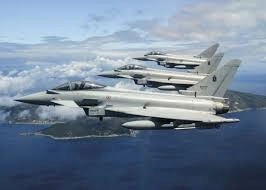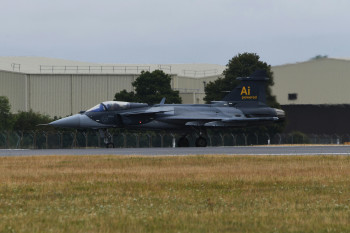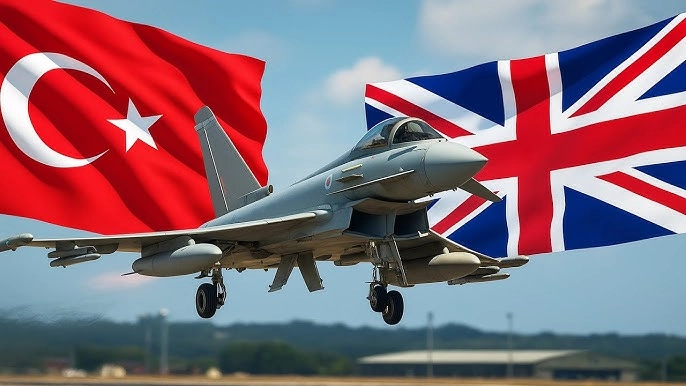Turkey Signs Eurofighter Agreement with UK: What Does This Mean for Regional Defense?
Introduction: A Landmark Defense Deal
What does Turkey's recent agreement to acquire Eurofighter Typhoon jets from the UK signify for regional security? Why did Turkey choose this advanced fighter aircraft, and how will it impact NATO's strategic posture? On November 23, 2023, Turkey signed a preliminary agreement with the UK to purchase 40 Eurofighter Typhoon jets, marking a significant shift in its defense procurement strategy. This deal comes after prolonged negotiations and reflects Ankara's ambition to modernize its air force amid evolving geopolitical challenges.
The Eurofighter Typhoon, a fourth-generation multirole fighter, is renowned for its agility, advanced avionics, and combat versatility. By acquiring these jets, Turkey aims to fill the gap left by its exclusion from the F-35 program and strengthen its air defense capabilities. But beyond the technical aspects, this agreement carries broader implications for Turkey's defense partnerships and regional influence.

Why the Eurofighter? Turkey's Strategic Calculations
Multiple strategic considerations drive Turkey's decision to pursue the Eurofighter Typhoon. First, the country has faced setbacks in its defence modernisation efforts, particularly after its removal from the F-35 Joint Strike Fighter program due to its acquisition of the Russian S-400 missile system. The Eurofighter offers a credible alternative, combining cutting-edge technology with interoperability within NATO frameworks.
Second, the Eurofighter's performance in combat scenarios, such as its deployment by the UK Royal Air Force in missions over Syria and Libya, demonstrates its reliability. Turkey, which has been involved in regional conflicts, requires an aircraft capable of air superiority and ground attack missions—a role the Typhoon excels in.
Lastly, this deal strengthens Turkey's defence ties with the UK, a key NATO ally. Amid strained relations with the US, diversifying partnerships has become a priority for Ankara. The agreement includes technology transfer and co-production clauses, which align with Turkey's long-term goal of achieving self-sufficiency in defence manufacturing.
The Technical Edge: Capabilities of the Eurofighter Typhoon
The Eurofighter Typhoon is a formidable asset in modern aerial warfare. Its key features include:
- Supercruise Ability: The jet can sustain supersonic speeds without afterburners, enhancing fuel efficiency and mission range.
- Advanced Radar Systems: The Captor-E AESA radar provides superior detection and tracking of multiple targets.
- Multirole Flexibility: It can switch between air-to-air and air-to-ground missions seamlessly, making it ideal for Turkey's diverse security needs.
For example, the German Air Force has successfully used Eurofighters in NATO's Baltic Air Policing mission, showcasing their effectiveness in collective defense operations. Turkey's acquisition of these jets will enable it to contribute more robustly to similar NATO missions while deterring regional threats.
Geopolitical Implications: Shifting Alliances and Regional Power Balance
Turkey's Eurofighter deal is not just about hardware—it signals a recalibration of its geopolitical stance. By deepening defense collaboration with the UK, Turkey is diversifying its alliances beyond traditional partners. This move could reduce its dependence on US-made systems and foster closer ties with European defense industries.
Moreover, the agreement may influence regional dynamics. Countries like Greece, which also operates Eurofighters, will closely monitor Turkey's deployment of these jets. In the Eastern Mediterranean, where tensions over energy resources persist, advanced fighter capabilities could alter the military equilibrium.
A real-world parallel can be drawn to India's acquisition of Rafale jets from France, which bolstered its air power vis-à-vis regional rivals. Similarly, Turkey's Eurofighters could enhance its deterrence against potential adversaries.
Economic and Industrial Benefits: Local Production and Job Creation
Beyond defense, the Eurofighter agreement promises economic advantages for Turkey. The deal includes provisions for local assembly and technology transfer, which align with Turkey's "National Combat Aircraft" (MMU) project. By gaining expertise in advanced aerospace manufacturing, Turkey aims to position itself as a regional hub for defense technology.
For instance, the UK's BAE Systems has expressed interest in collaborating with Turkish defense firms, potentially creating high-skilled jobs and boosting the local economy. This mirrors past successes like South Korea's KF-21 program, where international partnerships accelerated domestic aerospace capabilities.
Additionally, the deal could open doors for Turkish defense exports. If Turkey masters certain Eurofighter components, it may supply them to other operators worldwide, further integrating into the global defense market.

Challenges and Future Prospects
While the Eurofighter deal is a milestone, challenges remain. Financing the acquisition amid Turkey's economic constraints will require careful planning. Furthermore, integrating the Typhoon into Turkey's existing fleet—which includes US-made F-16s—demands extensive training and logistical adjustments.
Looking ahead, the agreement could pave the way for deeper UK-Turkey collaboration in next-generation defense projects, such as the Tempest fighter program. If successful, this partnership may redefine Turkey's role in NATO and global defense markets.
In conclusion, Turkey's Eurofighter agreement with the UK is a multifaceted development with far-reaching implications. From bolstering air power to reshaping alliances, this deal underscores Turkey's determination to assert itself as a key player in regional and global security.






